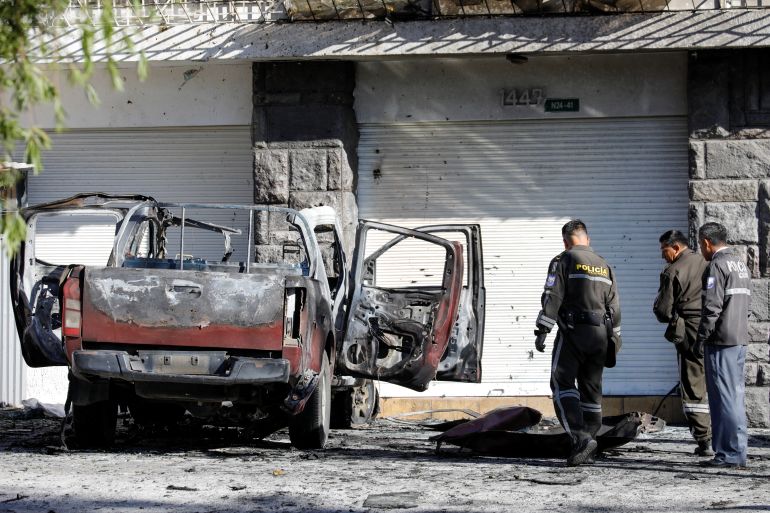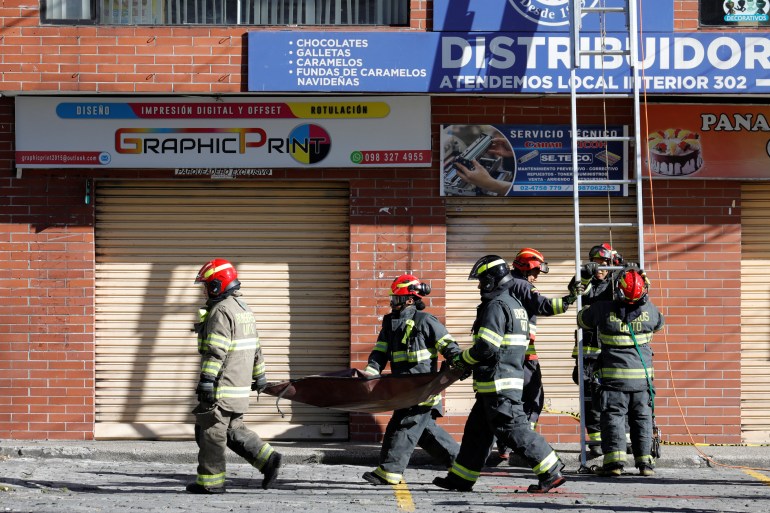Ecuadorian police arrest six after car bombs explode in Quito
South American nation is grappling with surge in violence as voters prepare for October presidential run-off.

Police in Ecuador have arrested six suspects after a car bombing in a commercial area of the capital, Quito, as the South American nation grapples with a surge in violence that authorities say is linked to drug trafficking.
The explosion late on Wednesday did not cause any casualties, police said.
Keep reading
list of 3 itemsAfter a deadly campaign, can Ecuador’s election bring peace?
‘Historic’: Ecuador voters reject oil drilling in Amazon protected area
The vehicle exploded due to the ignition of “two gas cylinders with fuel, a slow fuse and apparently dynamite sticks”, police investigations director Pablo Ramirez told reporters.
Ramirez said agents arrested six people, among them a Colombian national, several kilometres from the site of the explosion hours after the incident. The suspects have a record of extortion, robbery and murder, he said.
A second vehicle that contained two cylinders of petrol and a slow fuse also exploded nearby at an office of Ecuador’s prisons agency, police said on Thursday morning.

It caused “destruction of the vehicle and damage to the exterior” of the building, but no injuries were reported.
Ecuador has faced months of rising violence, particularly in its prisons, where a series of deadly riots have broken out over what officials say is an escalating battle over lucrative drug trafficking routes.
The country also was shaken this month when presidential candidate Fernando Villavicencio was assassinated during an election campaign stop in Quito.
Villavicencio, a 59-year-old anticorruption campaigner, had complained of receiving death threats before he was fatally shot on August 9.
Outgoing President Guillermo Lasso declared a nationwide state of emergency in response to the killing, saying the crime “will not remain unpunished”.
“Organised crime has gone very far, but all the weight of the law will fall on them,” Lasso said at the time.
Ecuador’s murder rate since 2018 has quadrupled, kidnappings are rife and a string of clashes between rival drug gangs has killed at least 430 people in Ecuadorian prisons since 2021.
Last year, the country hit a record 26 murders per 100,000 inhabitants – higher than the rates of Colombia, Mexico and Brazil.
Still, car bombings are an unusual occurrence in Quito.
This week’s incidents came as authorities conducted operations in Cotopaxi prison on Wednesday. Transfers of gang leaders have previously caused rioting in the detention facilities, but no transfers of any high-level prisoners have been confirmed.
There were also reported security incidents on Wednesday in the Turi prison in Cuenca, but authorities have not given details.
Stemming the rise in violence and restoring a sense of safety is a key demand of many Ecuadorians as they prepare to cast their ballots for the presidential run-off on October 15.
Daniel Noboa, a 35-year-old millionaire son of a banana magnate, will face off against Luisa Gonzalez, a lawyer close to divisive former left-wing President Rafael Correa, in the upcoming vote.
“Groups of narco-terrorists are involved here. We are living through a war,” Noboa told the Agence France-Presse news agency in a recent interview, promising to lock up convicts on a prison ship.